| |
"As for the celebrity aspect, people know that if they spot me on the street, I'll talk to them. I won't be in a limousine flashing by with two blondes and a bottle of champagne. Though, mind you, that's not a bad idea either." |
| |
Iconic Cockney movie star, Michael Caine |
After a hundred and forty movies, two Oscars and almost sixty years of professional experience, you'd think Michael Caine's reputation for thespianic excellence was assured. He's still working, looking for good reasons to get up at 6.30, learn lines and emote in front of a lens. But Caine's greatest talent lies less in his acting range as it does in his seemingly effortless screen persona. It takes some skill to be this natural in front of a camera and a few dozen jaded technicians. What Caine brings to all of his roles is an embedded morally dubious charm and, critically for any actor, honesty. Watch his first close up in The Italian Job. He briefly looks right into the lens, very briefly but it's a nice moment. Watching him watching us is a simple pleasure. As an upper class officer in Zulu, the role that got him noticed, he was straitjacketed by the demands of his character's class. Caine, or Maurice Micklewhite as he was as a child and still is among friends, was as far from upper class as you could imagine. It's no coincidence that his breakout role of Alfie was pretty close to Caine as he saw himself in the 60s. He admits he only got into acting because he fancied two of the girls in the drama class. But Caine's best loved film, from a UK perspective, is probably 'the one with the Minis'.
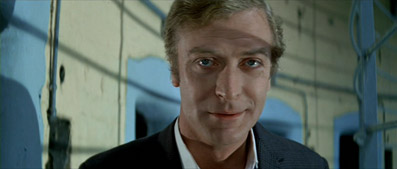
Folks of my age regard The Italian Job with the rosiest tinted spectacles peering through a fog of nostalgia so thick, you almost forgive the casual 1969isms on race and sex. They surface like tiny, odd, foul smelling bubbles reminding you that socially we've come quite a way in 40 years. The Italian Job is the quintessential caper movie. It's an entire ninety-five minutes made in the spirit of that one extraordinary shot in the Bond movie The Spy Who Loved Me – you know the one... Bond skis off a cliff and releases his parachute, a glorious 'screw you' Union Jack... some secret agent. Even the gold-laden Minis are red, white and blue and throughout the final sequence drive resolutely in that order. Uncomfortably, there is even a line in the film; "Bloody foreigners." This reinforces the ridiculous stereotype of the superiority of the Brits. Post-colonial England had something to prove and instead of standing taller, they lowered everyone else. That said, Troy Kennedy-Martin's screenplay is archly amusing, solid and well designed to make the average Brit feel a little better about him/herself. It'll be interesting to see how Kennedy-Martin's superb TV series Edge Of Darkness stands up against the movie remake (with Mel Gibson in the lead).
For those of you too young to know the original and those poor souls who've witnessed the remake, here's the plot in a nutshell. An Italian criminal mastermind has figured out the perfect smash and grab raid. The Mafia expensively bump him off (one can only assume for reasons of national pride) but his plan is taken up by ex-con Charlie Croker (Caine) who gets the funding from Mr. Bridger, a ludicrously well-treated criminal boss played by the director's godfather, Noël Coward. The idea is to bring Turin to a traffic-jammed halt, steal four million dollars' worth of gold bullion and drive it out of the stricken city in three Minis, the car du jour in the 60s. The ending is justifiably famous and there are a few classic lines of dialogue peppered throughout but what you really take home with you after you've seen it is the work of a then thirty-six year old, someone who shares an exact birth date with the movie's leading man. There'll be more about one of the most famous and respected of his trade in a moment.
The Italian Job is clean. It's slick and colourful and its humour (aside from the afore mentioned 'bubbles' which cannot be laid at anyone's door, the Zeitgeist being what it was at the Zeit) is blokey, sly and comic as in strip. It feels, in the best sense, like a movie made of brand new Lego. Everything fits with a satisfying snap and cuts together with an assurance born of skilled pre-planning. Looking at the traffic jam scenes I am filled with admiration for director Peter Collinson. There are no effects in this movie (with the exception of a few rear projected exterior scenes) and everything was done for real (heartbreaking if you are a car lover). But just the level of organisation blows me away every time I see it. In fact that admiration is woven tightly in with my childlike appreciation of the work. It's less of a movie and more of a logistic puzzle that's just too satisfying to ignore. Douglas Slocombe's cinematography is uncluttered and polished and I was just about to praise one of the second unit operators until I studied the shot in question a little more carefully. Just before the Minis break out onto an overpass, there is a long shot of the traffic jam and a whip pan right (about an hour and eighteen minutes in) that comes to such a rock solid stop that I was about to sing some serious operator praises. You try panning a Mitchell 35mm camera that fast and bringing it to a dead stop. Well, shame on me. It's a cut. Editor John Trumper has simply taken, one assumes, the whip pan and the rock solid part of the shot with the Minis obviously in frame and cut out the wobbly part. It works terrifically well.
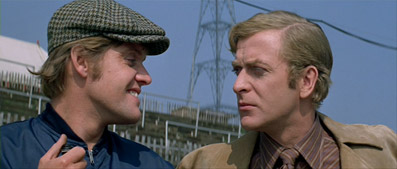
Charlie, fresh out of the nick, is picked up by his girlfriend who then takes him to an expensive hotel. Now imagine an eight year old's take on the next scene. The room is filled with attractive ladies all cooing at Charlie, hired for the occasion no doubt – by his own girlfriend. Cut. Caine, one assumes some hours later, staggers knackered and satisfied out of the hotel room. That scene bothered me as an eight year old. Forty years on it bothers me in a very different way. Regardless of the cliché of sex starved criminal released from prison obviously is ready for as much sex as he can or can't handle, there was a sort of poverty of imagination on my part. This scene is all about Charlie's needs but I kept thinking about the women. But this again is steeped in its time – free love (at a price). Multiple partners, hippy ideals. A few scenes later, Charlie then seduces two women simultaneously and is attacked by his girlfriend for being unfaithful. What? You know it's the 60s because the two girls run off up a London street dressed only in underwear. I half expected to see Benny Hill chase after them. Apparently all the women at the hotel were a coming out present. I'm not even going to visit pun-land and I know it wants me to.
The technical mastermind of the plan is played, lasciviously, by the afore mentioned 60s icon of comedy who has since been seriously reviled (another casualty of the Zeitgeist). A backhanded homage to him was recently broadcast on US TV via the character of Tracey Jordan in Tina Fey's marvellous 30 Rock. Benny Hill, as Professor Peach (oh, please), possesses an overwhelming and eye-rolling desire for large women. Threats of Mafia torture or Italian prison don't seem to stand up against his insatiable desire for rounded female flesh. The Italian Job is no Gomorrah. It is to real violence as Jim Davidson is to wit. Yes, there's some violence in the movie (one has to subdue the Italian guards with something) but it's presented as part of the fun (my latest viewing surprised me as I imagined being hit by a bloody big stick and it bloody hurt). There's also the odd idea that all Italian police drivers are unintelligent, less than brave and in at least two cases, somewhat blind. Of course, this is all part of the fun but I am very surprised that I'm even having these slight niggles. I think this is a positive development, another sign of the times and how those times are always a-changing (unless we're locked in fundamentalist dogma in an alternate universe where Dylan's classic would be 'The Times Are-A-Changing but we'll never change with them...')
So let's get to the real joy of the piece, the escape from Turin. The stunt driving of the Minis is a joy. There's nothing heart-stopping in terms of stunts but there is a consistency of purpose and it's just so much fun, each little vignette there for a smile and a little cheer. We cut inside to the drivers and passengers occasionally for a bon mot (obviously in a studio but who cares?) and then we're off again. My fondest appreciation of this sequence starts (to the frame) after the Mafia boss's line "If they planned this jam, they must have planned a way out..." It marks the start of the great Quincy Jones' immeasurable contribution to the movie. Now this man is a legend but he wasn't quite as legendary in 1969. It was producer Michael Deeley's faith in his talent that brought him over to England, family and all. And like a foreign football striker, Mr. Jones played a belter.
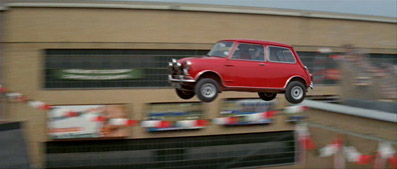
The score to The Italian Job is one of the most enjoyable and playful ones I've heard and particularly what's come to be known as 'The Self Preservation Society', a cue I have known by heart since I recorded it onto audio-cassette tape when it was first shown on TV in the 70s. It's the heart and soul of the movie and takes the mood by the scruff of the neck and celebrates the cocky, friendly crooks in ways that only music can achieve. Jones is probably more famous for his collaborations with Michael Jackson, Frank Sinatra and Steven Spielberg but he'll have a place in my movie rich heart for making a young boy giddy with pleasure. Yes, I am playing it behind me as I type. Glorious. As a side note, time has not dimmed its exuberance. There is no 'musicism' for it to run foul of.
The Italian Job is a perfect 1969 movie in the sense that it spins off and revels in the fashionable, heady times of social change, ignores all profundity, leaps on the ephemeral and frankly silly and just smiles in front of you as it unfurls, about as self-conscious as Liberace. Get past the politically incorrect blips and you'll have a ball.
This is a Paramount re-release that is being partly promoted on the new high definition transfer, and comparisons with their 2003 release show a definite picture upgrade, and the transfer on that one was no slouch. Looking at the two side-by-side, the new transfer has crisper detail (even on DVD and upscaled to a 42" plasma, the picture is sharp) and feels consistently brighter, resulting in colours that genuinely pop at times and contrast that looks spot-on throughout. Framed 2.35:1 and anamorphically enhanced, this is a damned fine transfer that could easily hold its own against more recent high budget Hollywood works. I'll bet the Blu-ray looks spanking.
The restored mono soundtrack and 5.1 from the previous release have been carried over here. Both are clean with a very reasonable dynamic range, but the 5.1 adds a notch of clarity and frontal stereo separation, though don't expect much from the rears.
Disc 1
Commentary with screenwriter Troy Kennedy-Martin and Matthew Field, author of 'The Making of The Italian Job'
Matthew Field plays the enthusiastic and knowledgeable feed man to Troy Kennedy-Martin, who looks back at the writing and making of the film and passes opinion on aspects of the finished product. This is a consistently interesting track, in part because of the alterations made to Martin's original script, changes he was not and is still is not always happy with. Gripes include the lightening of the original's tougher tone and the steering of some characters towards pantomime, and he has a particular complaint with the presentation of the Italian police as dolts and the transformation of Lorna into a bimbo. I'm absolutely with him there. Plenty of good ground is covered here, and don't worry, he still thinks it's a great film and there's plenty he's very happy with, including Caine's performance, Doug Slocombe's cinematography, John Trumper's editing, the substituted ending and the car chase, which he was blown away by when he first saw it. Asked if he is proud of the film, he tellingly admits that he wasn't then but is now.
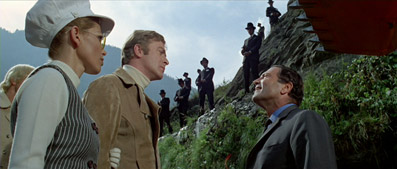
Commentary with producer Michael Deeley and Matthew Field
Despite Deeley's obvious smarts and talent (let's not forget he also produced Robbery, The Man Who Fell to Earth, The Deer Hunter and Blade Runner), this falls some way short of the previous track, in part because there is less background info than you might expect and much of that is supplied by Field, who gives the impression of knowing (or perhaps remembering) a lot more about the film than Deeley. There are still a fair few interesting bits and useful info (particularly on the subsequent careers of the supporting cast), but also a lot of dead spots between the chat. It's Deeley who provides the most amusing comment when, as silence reigns over the break-in of the Turin traffic control centre, he says, "Don't you think you should be saying something over this extremely dull sequence?" This is an extra carried over from the previous UK DVD release.
Mini Adventures (17:17)
A celebration of what many regard as the true star of the film, the Mini Cooper, which is enthused over by stunt driver Russ Swift (whose career as the leader of a Mini display team was inspired by his love affair with the movie), Italian Job director Peter Collinson's son and self-confessed Mini fanatic Tara Collinson, and vehicle suppliers, drivers and actors in the film Barry Cox and David Salamone. As in almost every extra here, the skills of stunt coordinator Rémy Julienne come in for particular praise. An energetic and entertaining piece, it's a great ad for the car, at least in its original incarnation.
Music Video (3:38)
Bits of the film cut to guess which song. Very linear in its assembly of extracts, the editing is functional and has little of the energy that the term 'music video' might suggest.
The Deleted Scene with Commentary by Matthew Field (2:10)
The film's only deleted scene (which is discussed more in the documentary detailed below), in which the Minis and three Italian police cars dance a ballet to The Blue Danube in a large ballroom. As Field states on the optional commentary, it's a fun scene in itself, but has no place in the sequence that it would have disrupted.
Theatrical Trailer (3:05)
The original trailer? Not sure about this one. It's in spanking condition and oddly looks more modern than one below.
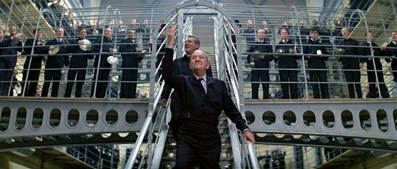
Re-release Trailer (1:44)
Made for the 30 year anniversary re-release, this certainly looks to be the real thing.
Disc 2
The Self Preservation Society (86:54)
A substantial, detailed, informative and thoroughly enjoyable retrospective documentary on the writing and making of the film and its subsequent rise to cult status. Broken up into chapters that focus on the director, the casting, pre-production, the shoot, the getaway, and post-production, amongst others, it's largely interview driven, but just about all of the key players on both sides of the camera who are still with us (director Collinson unfortunately died of cancer at a criminally early age) are on hand to recall what appears to have been a very happy memory for all. There's quite a bit of crossover with the commentaries, but so much here is new that even those familiar with Matthew Field's book should find it worthwhile. Rémy Julienne's stunt driving team once again come in for particularly praise (he's interviewed too, of course), and newcomers to the background details can get ready to be surprised by who actually wrote the oh-so-British 'Self Preservation Society' song, and just where he got his ideas.
When asked for his opinion on why The Italian Job has built such a following in recent years, Troy Kennedy-Martin – in the commentary on this very disc – suggests it has something to do with the rise of what's been dubbed Lad Culture, and he may well have a point. All the components are in place – Brits abroad with a low regard for the culture and people of the country they are aggressively invading, sexually available women on hand to serve the men, cars driven fast through pedestrian areas and performing dangerous stunts, a rampant patriotism that borders on the embarrassing, and a song that has become a football terrace chant. That the film survives this stuck-in-time negativity, and does so with serious aplomb, really is down to the wit, energy and genuine panache of its execution. Caine is perfectly cast, and while I agree with Troy Kennedy-Martin that Nicol Williamson would have brought a welcome degree of real threat to the role of Bridger and that a real boffin would have worked better than Benny Hill's cartoon lecher, the supporting cast are still something of a delight. And yes, the final chase is an absolute blast and it really is impossible to imagine the film without Quincy Jones' jaunty score. It's a terrific caper movie and enormous fun to boot – just watch the witless remake if you need any confirmation.
Paramount's new DVD release is as close to the definitive version as you're likely to get without moving up to Blu-ray, and though I've not seen that disc yet, I'm willing to bet that's the one to go for. A damned fine job. |